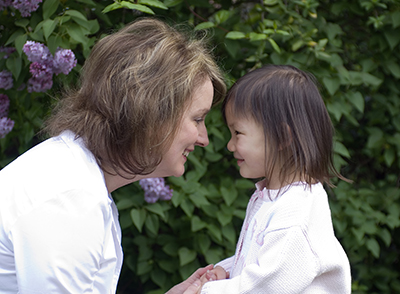Expert Team Clinics
Early Development-Infant & Preschool (EDIP) Team
 Our psychologists specialize in early infant and toddler developmental and diagnostic evaluations, as well as management of behavioral issues. Parents are sometimes concerned about their baby's or toddler's development or behaviour. Some children are born at risk for developmental problems, some have neuropsychological or genetic issues, or some simply present with concerning lags in their development, such as in language development, motor development or play. Early identification of your child's issues and needs can be critical to their progress and outcome. Our team of developmental psychologists have expertise in Infant and toddler developmental assessments. Yes, it is possible to consult, to have your young child evaluated, and to receive feedback and recommendations from infant and toddler experts. It is never too early! especially if you are worried about your infant or toddler. Dr. Tsonis is the head of this team and has conducted hundreds of infant and toddler evaluations with both high-risk and typically developing populations. Her research background in sensory, perceptual and cognitive development includes studies with infants as young as 3-months old.
Our psychologists specialize in early infant and toddler developmental and diagnostic evaluations, as well as management of behavioral issues. Parents are sometimes concerned about their baby's or toddler's development or behaviour. Some children are born at risk for developmental problems, some have neuropsychological or genetic issues, or some simply present with concerning lags in their development, such as in language development, motor development or play. Early identification of your child's issues and needs can be critical to their progress and outcome. Our team of developmental psychologists have expertise in Infant and toddler developmental assessments. Yes, it is possible to consult, to have your young child evaluated, and to receive feedback and recommendations from infant and toddler experts. It is never too early! especially if you are worried about your infant or toddler. Dr. Tsonis is the head of this team and has conducted hundreds of infant and toddler evaluations with both high-risk and typically developing populations. Her research background in sensory, perceptual and cognitive development includes studies with infants as young as 3-months old.
Autism Spectrum Disorders (ASD) Team
 The clinic's ASD team currently consists of three doctoral level psychologists all of whom have received certified training in the assessment of ASD, and have many years of clinical experience with ASD. Drs Tsonis and Campisi have both conducted diagnostic assessments on multidisciplinary teams and Dr. Richard has years of experience in management of ASD behaviours (including severe behaviour problems) within the public rehabilitation centres.
The clinic's ASD team currently consists of three doctoral level psychologists all of whom have received certified training in the assessment of ASD, and have many years of clinical experience with ASD. Drs Tsonis and Campisi have both conducted diagnostic assessments on multidisciplinary teams and Dr. Richard has years of experience in management of ASD behaviours (including severe behaviour problems) within the public rehabilitation centres.
ASD evaluations involve a thorough parent interview, administration of standarized (golden standard) measures such as the ADOS-II and the ADI-R. Additional tests (such as Theory of Mind tests) and questionnaires are also used as necessary. Our psychologists also find it very useful in some cases to conduct child observations at daycare or school. As more and more children are being suspected of and referred for ASD, we are seeing increasing numbers of children with "mild" forms of ASD. These children are often difficult to diagnose. However, with a thorough and systematic assessment process, we can come to an understanding of how to best conceptualize the difficulties each specific child is having. For instance, not all children with poor social skills or with few friends have ASD. Poor social skills and peer relationships can also be associated with a number of other childhood disorders. Whatever the case may be for your child, rest assured that our team will investigate all aspects of your child's functioning in order to most accurately come to an understanding about whether a diagnosis of ASD can explain your child's issues. On the more complex diagnostic cases, we collaborate as a team in a child's evaluation…with the consent of the parents, more than one psychologist may be present at your child's testing sessions.
Evaluations are concluded with one or more parent feedback sessions. Parent feedback sessions are thorough and include recommendations for each child's intervention plan, including as necessary recommendations for schooling. Feedback and information is also provided to parents about their child's diagnosis, prognosis, services in the public and private sectors, and they are guided as to how to go about obtaining services. Reports are provided which detail all critical information pertaining to the assessment and the diagnosis, and the recommendations and referrals (as needed) for intervention services. Parents are also assisted in applying for government funds and tax credits.
Child & Adolescent School & Learning (CASL) Team
 Elementary and high school students are often referred to us for learning and behavioural issues. Psychologists on the school & learning team can diagnose school-related problems such as intellectual or cognitive issues, broad-based or specific learning disabilities (e.g., ADHD, dyslexia, disorthographia, dysgraphia, etc…). Evaluations are conducted using standardized and the most recent versions of tests. We aim to conclude each evaluation with an understandng of WHY your child is having learning or behaviour problems at school and WHAT can best account for your child's issues. A feedback session is held during which the results are explained, and the recommendations are discussed. In addition, ample time is given during each feedback meeting for the parents to ask their questions or to raise their concerns about their child's diagnosis, schooling issues, and even about their child's future in general. The reports of the psychological evaluations are tailored to your child's needs, and include intervention strategies for the home (e.g., structuring homework period) and for the school. In addition, referrals are provided to appropriate academic remediation and/or tutoring services
Elementary and high school students are often referred to us for learning and behavioural issues. Psychologists on the school & learning team can diagnose school-related problems such as intellectual or cognitive issues, broad-based or specific learning disabilities (e.g., ADHD, dyslexia, disorthographia, dysgraphia, etc…). Evaluations are conducted using standardized and the most recent versions of tests. We aim to conclude each evaluation with an understandng of WHY your child is having learning or behaviour problems at school and WHAT can best account for your child's issues. A feedback session is held during which the results are explained, and the recommendations are discussed. In addition, ample time is given during each feedback meeting for the parents to ask their questions or to raise their concerns about their child's diagnosis, schooling issues, and even about their child's future in general. The reports of the psychological evaluations are tailored to your child's needs, and include intervention strategies for the home (e.g., structuring homework period) and for the school. In addition, referrals are provided to appropriate academic remediation and/or tutoring services
Child & Adolescent Therapy (CAT)
 Children and adolescents are often referred for problems such as refusal to go to school, frequent crying, low self-esteem, being anxious, not having friends, being quick to anger and being prone to explosive behaviour, being argumentative, oppositional and defiant, being bullyied or exposed to other traumas, having difficulty adjusting to a divorce, and many many more issues. Parents are often very concerned or confused about how to cope with the challenges that their children or adolescents present. Parents often come to us stating that they have read all the books, implemented all the techniques and nothing has worked. There are some things that parents can assess and treat themselves, like some cuts and scrapes and bruises, but sometimes they need additional help and expertise. At Your Psychology Clinic, we believe that there cannot be good intervention without good assessment…good individualized assessment of what is going on with each child and each family. This assessment may entail formal testing with your child (if merited as in cases where neuropsychological issues are suspected to lie behind behavioural issues) or socio-emotional assessment of the child as well as family assessments.
Children and adolescents are often referred for problems such as refusal to go to school, frequent crying, low self-esteem, being anxious, not having friends, being quick to anger and being prone to explosive behaviour, being argumentative, oppositional and defiant, being bullyied or exposed to other traumas, having difficulty adjusting to a divorce, and many many more issues. Parents are often very concerned or confused about how to cope with the challenges that their children or adolescents present. Parents often come to us stating that they have read all the books, implemented all the techniques and nothing has worked. There are some things that parents can assess and treat themselves, like some cuts and scrapes and bruises, but sometimes they need additional help and expertise. At Your Psychology Clinic, we believe that there cannot be good intervention without good assessment…good individualized assessment of what is going on with each child and each family. This assessment may entail formal testing with your child (if merited as in cases where neuropsychological issues are suspected to lie behind behavioural issues) or socio-emotional assessment of the child as well as family assessments.
In order to fully understand a child, we need to consider all aspects of his/her functioning and all aspects of his/her world. It is important to know how a child is doing at home, at school, what their developmental history is, whether there have been any changes in their lives, whether they have any medical conditions, whether there may be an underlying learning or social deficit, etc… before we recommend a therapy plan. We have a family-based approach and therefore implicate parents in the assessment process. The therapy plan may involve family sessions, parent-child dyadic work, or individual child sessions, depending on the situation. Therapy plans are clearly explained to the parents and child, and are agreed upon and reviewed periodically with each family.
Adoption and Attachment Parenting (APP-clinic)
 This clinic is for children and parents affected by adoption issues. This clinic provides time limited, or as needed, consults to prospective parents (in preparation for fostering or adopting a child), more intensive intervention for parents who are facing attachment, behavioural or other developmental issues with their children and/or intervention for adopted children having attachment issues. In addition, services are offered to adolescents and adults who have been adopted and feel a need to resolve personal issues surrounding their adoption histories. Dr. Tsonis is particularly fond of this service, since she is also an adoptive mother. Apart from her experiences with adoption, she has received specialized training in attachment and adoption within the context of her various clinical training experiences during her doctoral studies, as well as more recent training at the adoption clinic at Ste Justine's Hospital, and the University of Quebec (in Montreal; UQAM).
This clinic is for children and parents affected by adoption issues. This clinic provides time limited, or as needed, consults to prospective parents (in preparation for fostering or adopting a child), more intensive intervention for parents who are facing attachment, behavioural or other developmental issues with their children and/or intervention for adopted children having attachment issues. In addition, services are offered to adolescents and adults who have been adopted and feel a need to resolve personal issues surrounding their adoption histories. Dr. Tsonis is particularly fond of this service, since she is also an adoptive mother. Apart from her experiences with adoption, she has received specialized training in attachment and adoption within the context of her various clinical training experiences during her doctoral studies, as well as more recent training at the adoption clinic at Ste Justine's Hospital, and the University of Quebec (in Montreal; UQAM).
